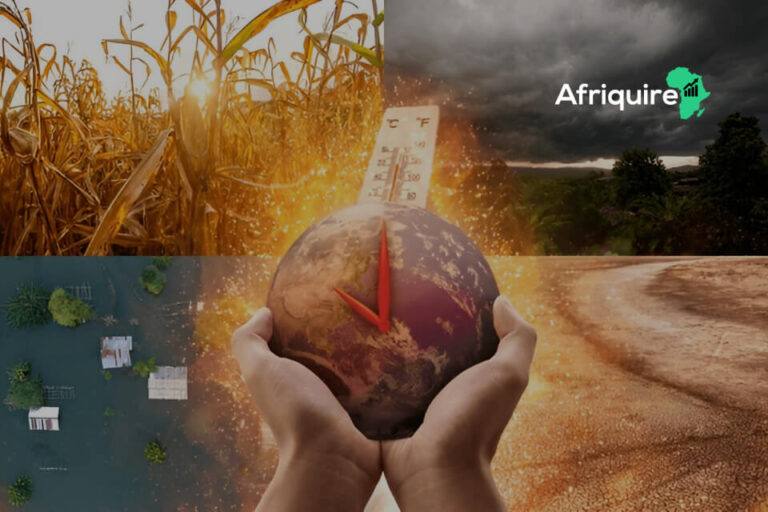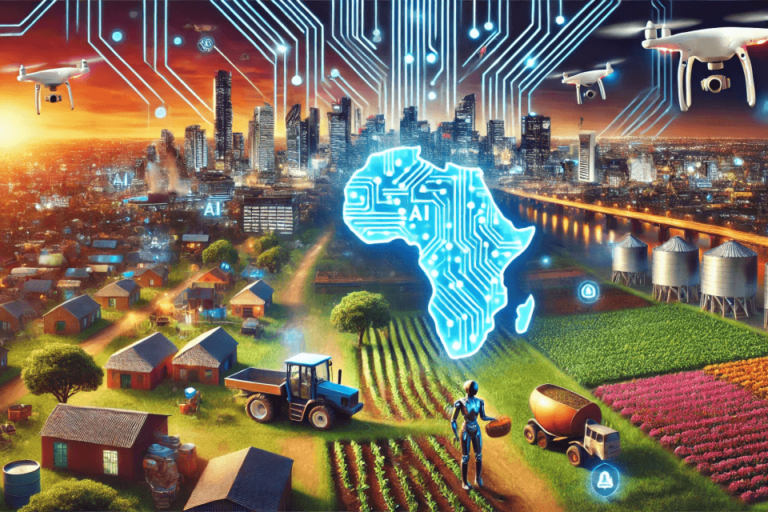- Introduction
- Introduction to Tech Innovation in African Agriculture
- Overview of Technological Advancements in Agriculture
- The Role of AgriTech in Enhancing Productivity
- 4 Emerging Trends in African Agricultural Innovation
- How Technology Is Addressing Food Security in Africa
- Future Outlook
- 5 Frequently Asked Questions (FAQs)
Introduction
In the last ten years, tech innovation in African agriculture has significantly shifted how the continent grows its food. Farmers now rely on the latest tools and methods to produce more crops with less effort. Mobile phones provide crucial information on weather conditions and market prices, empowering farmers to make better decisions. Drones monitor fields from above, saving time and helping farmers detect issues much earlier.
These changes improve farming and provide young people with exciting job opportunities that combine technology and agriculture. With proper support, tech innovation in African agriculture will increase Africa’s potential to become a leading force on the continent in innovative farming methods and to feed its growing population. This article will highlight the latest trends in agricultural technology across the continent and point out excellent opportunities to grow and develop. Adopting these new ideas means a brighter future for both farmers and communities.
Introduction to Tech Innovation in African Agriculture
Technological breakthroughs have had an impact on changing farming in Africa. As the continent tackles various issues, new tools are being developed to boost farming methods, increase output, and secure food supplies. Let’s dive into farming’s key role in Africa’s economy, farmers’ hurdles, and how tech is shaking things up.
- Importance of Agriculture in Africa’s Economy
Farming forms the backbone of Africa’s economy, supporting millions of people. It gives jobs to about 60% of the continent’s workers and adds a lot to GDP in many countries. Farming feeds people and props up industries like food processing and clothing. It is crucial for trade, as many African countries sell farm goods like cocoa, coffee, and fruits to other nations.
Agriculture matters for more than just the economy. It helps fight poverty by creating jobs and bringing in money for families. Putting resources into farming can improve nutrition and health, as people can get more fresh food. This means making farming stronger is key to Africa’s long-term growth.
- Challenges Faced by African Agriculture
African agriculture plays a crucial role, yet it grapples with obstacles that slow its progress. Climate change is a key problem, bringing erratic weather that hurts crop output. Droughts or floods can wipe out harvests, leaving farmers hard-pressed to feed their loved ones and neighbours.
Another roadblock is the lack of tech access. Many small-scale farmers don’t have the means to use cutting-edge farming methods or gear that could boost their output. Moreover, poor infrastructure, such as bad roads and storage spots, makes it challenging for farmers to sell their goods.
Lastly, there are issues related to financing. Many farmers can’t get loans or banking services to buy better seeds or tools. They struggle to expand their farms and improve their lives without proper cash flow.
- Role of Technology in Transforming African Agriculture
Technology has the potential to address many of these challenges and transform African agriculture. For example, precision agriculture employs data analytics and satellite imagery to inform farmers’ decisions on planting and harvesting. This approach optimises resources for them and increases yields while reducing waste.
Besides, mobile technologies have changed how farmers access information and markets. In this regard, farmers could receive weather updates, market prices, and advice on best practices directly through their phones, enabling them to make better decisions and increase profits.
In addition, drones are used for monitoring crops and land conditions. They provide real-time data that helps farmers identify issues early on, allowing them to take action before problems escalate.
In conclusion, tech innovation is crucial in addressing the challenges faced by African agriculture. Improving access to technology and information can enhance productivity and food security across the continent.
Overview of Technological Advancements in Agriculture
Farming is also changing with technological changes that are making farming more straightforward and more productive for farmers. Let’s look at some key areas where technology significantly impacts.
- Precision Agriculture and Its Applications
Precision agriculture is a method of farming that is done with the help of technology to assist farmers with better land management. It enables them to use the right amount of inputs, whether water, fertilisers, or pesticides, at the right time and place. For example, field sensors can determine soil moisture and nutrient levels. The farmer uses that information to decide when to irrigate and how much fertiliser he needs. This approach increases crop yield, reduces waste, and cuts the cost of farming, making it sustainable.
- Role of Drones, Satellite Imaging, and IoT in Agriculture
Drones, satellite imaging, and the Internet of Things are changing how farmers gather information about their crops. Drones are small flying machines that can hover over fields and take high-quality pictures. These images allow farmers to monitor the health of their crops and identify problems, such as pests or diseases, much earlier than would otherwise be possible. By seeing these issues in real-time, farmers can act fast and avoid damage.
Satellite imaging gives farmers a broader view of their land. It helps them understand weather patterns, soil conditions, and how land is used. This information is helpful for planning when to plant crops and how to manage water and nutrients. With these tools, farmers can make smarter decisions to improve their yields.
The IoT connects sensors and devices in the field to the internet, enabling farmers to monitor their land remotely. For instance, sensors can track temperature, humidity, or soil moisture- all of which can be sent directly to a farmer’s smartphone. This helps farmers stay abreast of conditions in real-time, even when not on the farm.
- Advances in Agricultural Biotechnology
Another important area of emerging technology is agricultural biotechnology. This involves using science to develop crops more resistant to pests, diseases, and harsh weather conditions. For example, genetically modified crops can be engineered to withstand drought or to produce more food per plant. This is particularly helpful in areas with unstable climates or limited resources such as water. These value-added crops will, therefore, assist farmers in bringing up production to meet the increased food demand around the world.
Nutritional enhancement is also carried out in crops through biotechnology. For example, scientists are developing crops rich in essential vitamins and minerals. As a result, this would combat malnutrition, especially in poorer areas where it is difficult to obtain good nutrition from diets.
- Digital Platforms and Marketplaces for Farmers
Ultimately, digital platforms and marketplaces are revolutionising how farmers sell their produce. In other words, through online platforms, farmers can sell their crops directly to buyers, either consumers or retailers, without intermediaries. That means that farmers can receive more value from their efforts and have more control over the prices of their products.
These platforms also give farmers access to useful information like market prices, trends, and advice on best farming practices. This helps farmers make better decisions to help them improve their business operations and increase profits.

The Role of AgriTech in Enhancing Productivity
AgriTech is playing an important role in improving productivity in agriculture all over Africa. By bringing technology into farming, AgriTech helps farmers become more efficient, improve crop yields, and make smarter decisions. Let’s take a look at how AgriTech is changing farming in Africa.
- Increased Efficiency and Reduced Costs
One of the most significant benefits of AgriTech is they need that it is more efficient and has less cost. With precision farming, farmers can use their resources better. For example, sensors and data analytics can tell farmers exactly how much water, fertiliser and pesticides they need to use on their crops. So they don’t waste money or resources, and it helps the environment.
Automation technology, like robotic harvesters and planters, also helps farmers reduce manual labour. These machines can do the work faster and with less effort, resulting in more productivity. With more work done in less time, farmers can focus on other parts of their business, such as marketing their products or planning for the future.
- Improved Crop Yields and Quality
AgriTech is also helping farmers achieve higher crop yields and better quality. Hydroponics and vertical farming allow farmers to grow more food in smaller spaces. These can be done all year round so food production can meet the growing crop demand.
Biotechnology also plays a big part in improving crops. With genetically modified seeds or biofortified crops, farmers can grow crops that are resistant to pests and diseases. So farmers get more crops from the same land, and they can produce healthier food. These advances help farmers and reduce food shortages in many areas.
- Enhanced Decision-Making Through Data Analytics
Another part of AgriTech is better decision-making using data analytics. Farmers now have access to much data to help them make better choices. For example, weather forecasting tools can tell farmers when to plant or harvest their crops. They can act early to protect their crops if rain or drought is expected.
Data analytics also helps farmers monitor how their crops are doing and the market prices of their products. Looking at crop growth trends and market conditions, they can decide what to plant and when to sell for the best price. Farmers can make better decisions to earn more and reduce losses with this information.
- Job Creation and Skills Development in Agriculture
AgriTech is creating jobs and developing skills in agriculture. As new technologies are introduced, more skilled workers are needed to operate and maintain these systems. This opens up opportunities for young people to learn skills in data analysis, using farm machines and sustainable farming practices.
Across Africa, new training programs are being set up to train people in these skills. With the right training, young people can be the next generation of agripreneurs and drive innovation and growth in the agriculture sector.
4 Emerging Trends in African Agricultural Innovation
Emerging trends in agricultural innovation are changing the way farming works in Africa. Let’s take a look at 4 key innovations that are shaping the future of agriculture.
- Vertical Farming and Urban Agriculture
Vertical farming has become increasingly popular for food production in urban areas. This method involves growing crops in vertically stacked layers or on vertical surfaces, often utilising hydroponics or aeroponics, which are techniques for cultivating plants in water or air. Such farms are particularly beneficial in densely populated cities where land is scarce. By producing fresh produce right at the point of consumption, these farms help reduce transportation costs.
Additionally, vertical farming can foster community engagement. It transforms vacant lots in cities into green spaces for food cultivation, positively impacting the environment. Food grown in urban farms lowers carbon emissions and encourages sustainable agricultural practices. As African towns expand, vertical farming offers a promising solution to meet the rising food demands.
- Blockchain Technology in Agricultural Supply Chains
Blockchain technology is gradually transforming how agricultural products are distributed from farms to consumers. Each transaction recorded on the blockchain is secure and immutable, creating transparency throughout the supply chain. This allows farmers, suppliers, and consumers to trace the origins of their food.
For example, blockchain enables consumers to verify that their food is fresh and sourced from reliable producers. This level of transparency builds trust between farmers and consumers, which is crucial for developing markets. Moreover, it helps minimise fraud and waste in the supply chain, allowing farmers to receive fair compensation for their goods.
- Artificial Intelligence and Machine Learning in Agriculture
Artificial intelligence and machine learning are set to transform how farmers manage their crops. These technologies can process vast amounts of data, providing valuable insights for farming decisions. For instance, AI can forecast weather trends, helping farmers determine the optimal times for planting and harvesting.
Additionally, machine learning aids in the early identification of crop diseases by analysing images taken with drones or smartphones. This allows farmers to take preventive measures before issues escalate, minimising losses and increasing food production. Over time, AI and machine learning empower farmers with the knowledge to enhance their agricultural practices.
- Mobile Payments and Financial Inclusion for Farmers
Mobile payments are revolutionising how to market agricultural products in Africa by transforming how farmers manage their finances. Many smallholder farmers lack access to conventional banking services, which makes receiving payments or securing loans challenging. By leveraging mobile payment systems, farmers can now conduct transactions effortlessly using their mobile devices, enhancing their ability to sell and promote agricultural products across diverse markets.
This technology simplifies payments and helps integrate more farmers into the financial system. Moreover, mobile payments like Opay, for example, allow farmers to receive payments directly from buyers via their phones, eliminating the need for cash transactions. Many of these platforms also provide microloans or insurance tailored for farmers. As mobile payments enhance access to financial services, farmers can invest in better seeds, advanced tools, and improved farming methods.

How Technology Is Addressing Food Security in Africa
Technology is playing a key role in solving food security problems in Africa by improving different areas of farming. Let’s look at how technology is helping farmers access markets and finance, improve crop resilience to climate change, reduce post-harvest losses, and encourage sustainable farming practices.
- Improving Access to Markets and Finance for Farmers
Access to markets and finance is crucial for the success of farmers. Technology is key in addressing this issue through mobile applications and online platforms that link farmers directly with buyers. These digital marketplaces enable farmers to sell their products without relying on intermediaries, allowing them to receive fair prices. Additionally, mobile banking services simplify farmers’ process of obtaining loans and financial assistance. With just their phones, farmers can secure funds for seeds, equipment, and other essential needs, which supports their business growth and enhances productivity.
- Enhancing Crop Resilience to Climate Change
Climate change poses a significant threat to food security in Africa, but technology is aiding farmers in tackling these challenges. One practical approach is precision farming, which utilizes data from sensors and satellites to monitor soil health and weather patterns. This information empowers farmers to make informed decisions about the optimal times for planting and irrigating their crops. Furthermore, biotechnology is being harnessed to create crops that can withstand extreme weather conditions, such as droughts and floods. With these climate-resilient varieties, farmers can continue to produce food even in adverse situations, helping to maintain a reliable food supply.
- Reducing Post-Harvest Losses Through Technology
Postharvest losses pose a significant challenge in African agriculture, with a large portion of produce lost due to inadequate storage and handling practices. Technology can help mitigate this issue by providing improved storage solutions and monitoring systems for agricultural products. For example, hermetic storage bags can effectively preserve grains, preventing pest infestations and moisture damage. Additionally, IoT devices can offer real-time monitoring of storage conditions, alerting farmers if temperatures or humidity levels rise too high. By minimizing post-harvest losses, technology plays a crucial role in ensuring that more food reaches consumers and helps reduce waste.
- Promoting Sustainable Agriculture Practices
Sustainable farming is essential for ensuring food security in the future. Technology aids sustainable agriculture by equipping farmers with tools to utilize their resources more effectively. For instance, drip irrigation systems conserve water by directing it straight to plant roots, thus reducing waste. Mobile applications also provide organic farming guidance, enabling farmers to adopt more environmentally friendly practices. By fostering sustainable farming, technology enhances food security and safeguards the environment for generations to come.
Future Outlook
- Future Prospects and Challenges for AgriTech in Africa
Agriculture technology presents a promising future, but some challenges must be addressed. On the positive side, technology has the potential to revolutionize farming truly. The rise of smartphones among farmers has improved access to vital information regarding weather, market prices, and farming techniques, which can lead to better yields and increased income. Moreover, innovations like solar-powered irrigation systems help farmers use water more efficiently, especially in regions where it is limited.
However, there are significant hurdles to overcome. Not all farmers have internet access or the latest devices, making it difficult to utilize these technologies. Additionally, training is essential; farmers must learn how to use their new tools effectively. Funding is another concern, as many small-scale farmers struggle to afford the implementation of new technology. Governments and organizations must provide the necessary support and resources.
While AgriTech holds a lot of potential for enhancing agriculture in Africa, it is vital to tackle these challenges to ensure that all farmers can take advantage of technological advancements.
Tech Innovation in African Agriculture: Trends and Opportunities

5 Frequently Asked Questions (FAQs)
1. What is tech innovation in agriculture?
Tech innovation in agriculture refers to using new technologies and methods to improve farming practices. This includes using drones, mobile apps, and smart sensors to help farmers grow crops more efficiently.
2. Why is tech innovation important for African agriculture?
It is important because Africa has to deal with food insecurities and extreme climate change. Tech innovations can help farmers grow more and waste less, hence adapting their methods to changing weather patterns.
3. What are some examples of technology applied in African farming?
These include precision farming tools, which use data for planting and harvesting at just the right time, mobile phone apps to provide weather forecasts, and irrigation systems powered by solar, which conserve water.
4. What opportunities does tech innovation create for young people in Africa?
Tech innovation creates employment in developing new technologies, managing farms with modern tools, or working with companies to support agricultural development that encourage entrepreneurship among youth.
5. What does the future hold for tech innovations in African agriculture?
With more and more startups rising to focus on agri-tech solutions for local needs, the future looks great for increased productivity and sustainability within the continent’s agricultural sector.
Conclusion
In the past few decades, African agriculture has experienced significant advancements due to technology. Farmers increasingly use smartphones and apps to access vital information about weather conditions and market prices, enabling them to make informed decisions about planting and selling. Drones also survey fields, allowing farmers to detect issues like pests or diseases early. Furthermore, some companies are developing specialized seeds that thrive in challenging conditions like droughts. These innovations empower farmers to increase food production and boost their incomes, which is crucial for supporting Africa’s growing population.
It is essential for all stakeholders in agriculture—governments, businesses, and investors—to prioritize the development of AgriTech. Embracing new technologies can enhance efficiency and productivity among farmers, leading to greater yields and improved livelihoods. Stakeholders should also offer training on these tools to ensure farmers understand their proper use. Moreover, partnerships between technology companies and local farmers could lead to groundbreaking solutions tailored to our needs. In conclusion, let’s come together to build a sustainable agricultural future in Africa, making technology an integral part of our lives!



